the Greek in Hebrew.
110So Haenchen, John, 1:114: "The darkness has not comprehended it." Similarly
Schnackenburg, John, 246-47: "If the evangelist is thinking in v. 5 of the encounter of the Logos, the light, with the world of men—as can hardly be doubted after v. 4—then of the two
possible meanings of καταλαμβανεΊν, "master" (=overwhelm) and "grasp" (= embrace with
mind and will), only the second can be considered." See also Brown, John, 1:8.
i n Cf . Bultmann, John, 45-46.
112I happily follow here Bultmann, John, 48 n. 1.
113Bultmann, "History of Religions," 42.
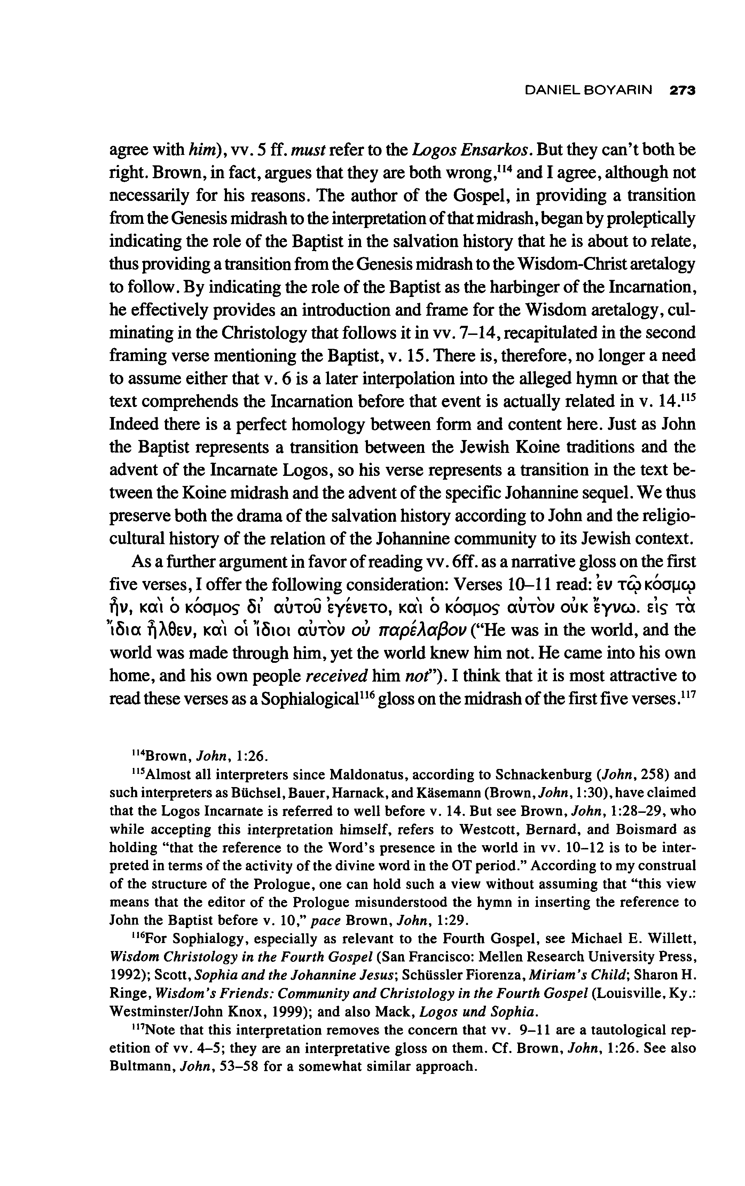
D A N I E L B O Y A R Í N 2 7 3
agree with him), vv. 5 ff. must refer to the Logos Ensarkos. But they can't both be right. Brown, in fact, argues that they are both wrong,114 and I agree, although not
necessarily for his reasons. The author of the Gospel, in providing a transition
from the Genesis midrash to the interpretation ofthat midrash, began by proleptically
indicating the role of the Baptist in the salvation history that he is about to relate,
thus providing a transition from the Genesis midrash to the Wisdom-Christ aretalogy
to follow. By indicating the role of the Baptist as the harbinger of the Incarnation,
he effectively provides an introduction and frame for the Wisdom aretalogy, cul-
minating in the Christology that follows it in vv. 7-14, recapitulated in the second
framing verse mentioning the Baptist, v. 15. There is, therefore, no longer a need
to assume either that v. 6 is a later interpolation into the alleged hymn or that the
text comprehends the Incarnation before that event is actually related in v. 14.115
Indeed there is a perfect homology between form and content here. Just as John
the Baptist represents a transition between the Jewish Koine traditions and the
advent of the Incarnate Logos, so his verse represents a transition in the text be-
tween the Koine midrash and the advent of the specific Johannine sequel. We thus
preserve both the drama of the salvation history according to John and the religio-
cultural history of the relation of the Johannine community to its Jewish context.
As a further argument in favor of reading vv. 6ff. as a narrative gloss on the first
five verses, I offer the following consideration: Verses 10-11 read: εν τω κόσμω
ήν, και ο κόσμος δι' αυτού εγένετο, και ο κόσμος αυτόν ουκ εγνω. εις τα
'Ίδια ήλθεν, και οι Ίδιοι αυτόν ου παρέλαβον ("He was in the world, and the
world was made through him, yet the world knew him not. He came into his own
home, and his own people received him nof). I think that it is most attractive to read these verses as a Sophialogical116 gloss on the midrash of the first five verses.117
114Brown, John, 1:26.
115Almost all interpreters since Maldonatus, according to Schnackenburg {John, 258) and
such interpreters as Biichsel, Bauer, Harnack, and Käsemann (Brown, John, 1:30), have claimed
that the Logos Incarnate is referred to well before v. 14. But see Brown, John, 1:28-29, who
while accepting this interpretation himself, refers to Westcott, Bernard, and Boismard as
holding "that the reference to the Word's presence in the world in vv. 10-12 is to be inter-
preted in terms of the activity of the divine word in the OT period." According to my construal
of the structure of the Prologue, one can hold such a view without assuming that "this view
means that the editor of the Prologue misunderstood the hymn in inserting the reference to
John the Baptist before v. 10," pace Brown, John, 1:29.
116For Sophialogy, especially as relevant to the Fourth Gospel, see Michael E. Willett,
Wisdom Christology in the Fourth Gospel (San Francisco: Mellen Research University Press,
1992); Scott, Sophia and the Johannine Jesus; Schüssler Fiorenza, Miriam's Child', Sharon H.
Ringe, Wisdom's Friends: Community and Christology in the Fourth Gospel (Louisville, Ky.:
Westminster/John Knox, 1999); and also Mack, Logos und Sophia.
117Note that this interpretation removes the concern that vv. 9-11 are a tautological rep-
etition of vv. 4-5; they are an interpretative gloss on them. Cf. Brown, John, 1:26. See also
Bultmann, John, 53-58 for a somewhat similar approach.
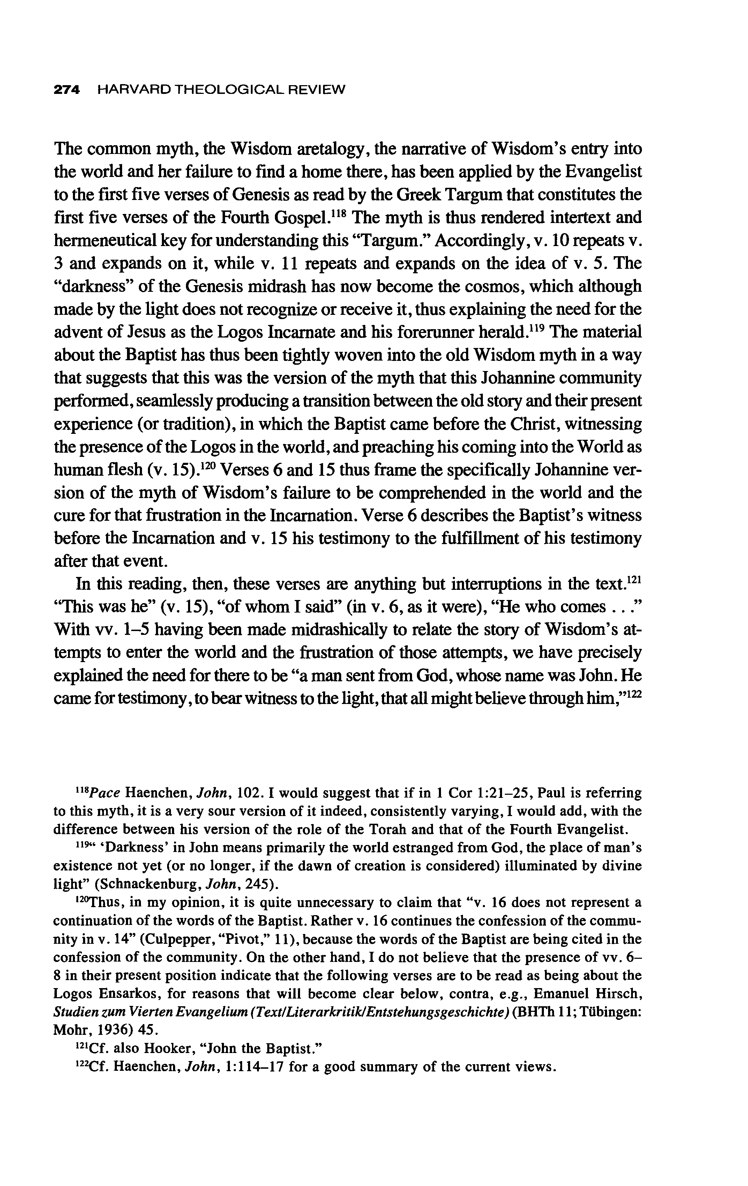
2 7 4 H A R V A R D T H E O L O G I C A L REVIEW
The common myth, the Wisdom aretalogy, the narrative of Wisdom's entry into
the world and her failure to find a home there, has been applied by the Evangelist
to the first five verses of Genesis as read by the Greek Targum that constitutes the
first five verses of the Fourth Gospel.118 The myth is thus rendered intertext and
hermeneutical key for understanding this "Targum." Accordingly, v. 10 repeats v.
3 and expands on it, while v. 11 repeats and expands on the idea of v. 5. The
"darkness" of the Genesis midrash has now become the cosmos, which although
made by the light does not recognize or receive it, thus explaining the need for the
advent of Jesus as the Logos Incarnate and his forerunner herald.119 The material
about the Baptist has thus been tightly woven into the old Wisdom myth in a way
that suggests that this was the version of the myth that this Johannine community
performed, seamlessly producing a transition between the old story and their present
experience (or tradition), in which the Baptist came before the Christ, witnessing
the presence of the Logos in the world, and preaching his coming into the World as
human flesh (v. 15).120 Verses 6 and 15 thus frame the specifically Johannine ver-
sion of the myth of Wisdom's failure to be comprehended in the world and the
cure for that frustration in the Incarnation. Verse 6 describes the Baptist's witness
before the Incarnation and v. 15 his testimony to the fulfillment of his testimony
after that event.
In this reading, then, these verses are anything but interruptions in the text.121
"This was he" (v. 15), "of whom I said" (in v. 6, as it were), "He who comes . . . "
With vv. 1-5 having been made midrashically to relate the story of Wisdom's at-
tempts to enter the world and the frustration of those attempts, we have precisely
explained the need for there to be "a man sent from God, whose name was John. He
came for testimony, to bear witness to the light, that all might believe through him,"122
n*Pace Haenchen, John, 102.1 would suggest that if in 1 Cor 1:21-25, Paul is referring to this myth, it is a very sour version of it indeed, consistently varying, I would add, with the
difference between his version of the role of the Torah and that of the Fourth Evangelist.
119« 'Darkness' in John means primarily the world estranged from God, the place of man's
existence not yet (or no longer, if the dawn of creation is considered) illuminated by divine
light" (Schnackenburg, John, 245).
120Thus, in my opinion, it is quite unnecessary to claim that "v. 16 does not represent a
continuation of the words of the Baptist. Rather v. 16 continues the confession of the commu-
nity in v. 14" (Culpepper, "Pivot," 11), because the words of the Baptist are being cited in the
confession of the community. On the other hand, I do not believe that the presence of vv. 6 -
8 in their present position indicate that the following verses are to be read as being about the
Logos Ensarkos, for reasons that will become clear below, contra, e.g., Emanuel Hirsch,
Studien zum Vierten Evangelium (Text/Literarkritik/Entstehungsgeschichte) (BHTh 11; Tübingen:
Mohr, 1936) 45.
121Cf. also Hooker, "John the Baptist."
122Cf. Haenchen, John, 1:114-17 for a good summary of the current views.
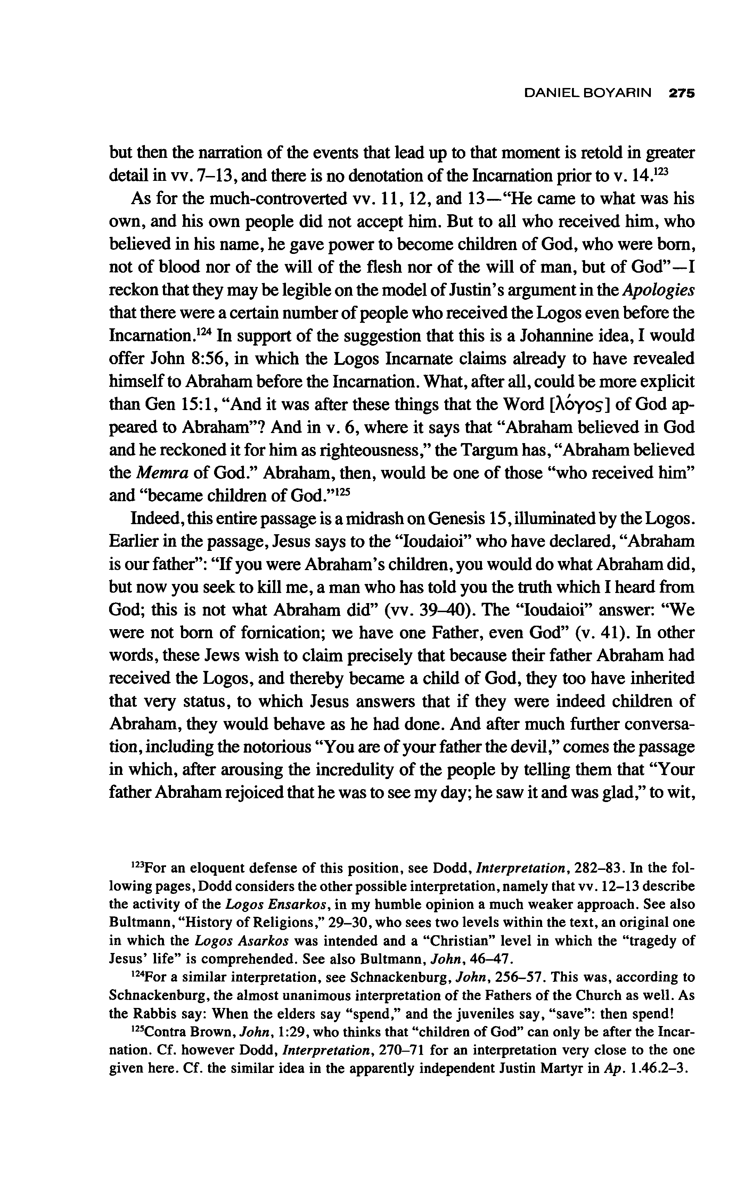
D A N I E L B O Y A R Í N 2 7 5
but then the narration of the events that lead up to that moment is retold in greater
detail in vv. 7-13, and there is no denotation of the Incarnation prior to v. 14.123
As for the much-controverted vv. 11,12, and 13—"He came to what was his
own, and his own people did not accept him. But to all who received him, who
believed in his name, he gave power to become children of God, who were born,
not of blood nor of the will of the flesh nor of the will of man, but of God"—I
reckon that they may be legible on the model of Justin's argument in the Apologies
that there were a certain number of people who received the Logos even before the
Incarnation.124 In support of the suggestion that this is a Johannine idea, I would
offer John 8:56, in which the Logos Incarnate claims already to have revealed
himself to Abraham before the Incarnation. What, after all, could be more explicit
than Gen 15:1, "And it was after these things that the Word [λόγο$] of God appeared to Abraham"? And in v. 6, where it says that "Abraham believed in God and he reckoned it for him as righteousness," the Targum has, "Abraham believed
the Memra of God." Abraham, then, would be one of those "who received him"
and "became children of God."125
Indeed, this entire passage is a midrash on Genesis 15, illuminated by the Logos.
Earlier in the passage, Jesus says to the "Ioudaioi" who have declared, "Abraham
is our father": "If you were Abraham's children, you would do what Abraham did,
but now you seek to kill me, a man who has told you the truth which I heard from
God; this is not what Abraham did" (vv. 39-40). The "Ioudaioi" answer: "We
were not born of fornication; we have one Father, even God" (v. 41). In other
words, these Jews wish to claim precisely that because their father Abraham had
received the Logos, and thereby became a child of God, they too have inherited
that very status, to which Jesus answers that if they were indeed children of
Abraham, they would behave as he had done. And after much further conversation, including the notorious "You are of your father the devil," comes the passage in which, after arousing the incredulity of the people by telling them that "Your
father Abraham rejoiced that he was to see my day; he saw it and was glad," to wit,
123For an eloquent defense of this position, see Dodd, Interpretation, 282-83. In the following pages, Dodd considers the other possible interpretation, namely that vv. 12-13 describe the activity of the Logos Ensarkos, in my humble opinion a much weaker approach. See also
Bultmann, "History of Religions," 29-30, who sees two levels within the text, an original one
in which the Logos Asarkos was intended and a "Christian" level in which the "tragedy of Jesus' life" is comprehended. See also Bultmann, John, 46-47.
124For a similar interpretation, see Schnackenburg, John, 256-57. This was, according to
Schnackenburg, the almost unanimous interpretation of the Fathers of the Church as well. As
the Rabbis say: When the elders say "spend," and the juveniles say, "save": then spend!
125Contra Brown, John, 1:29, who thinks that "children of God" can only be after the Incarnation. Cf. however Dodd, Interpretation, 270-71 for an interpretation very close to the one given here. Cf. the similar idea in the apparently independent Justin Martyr in Ap. 1.46.2-3.
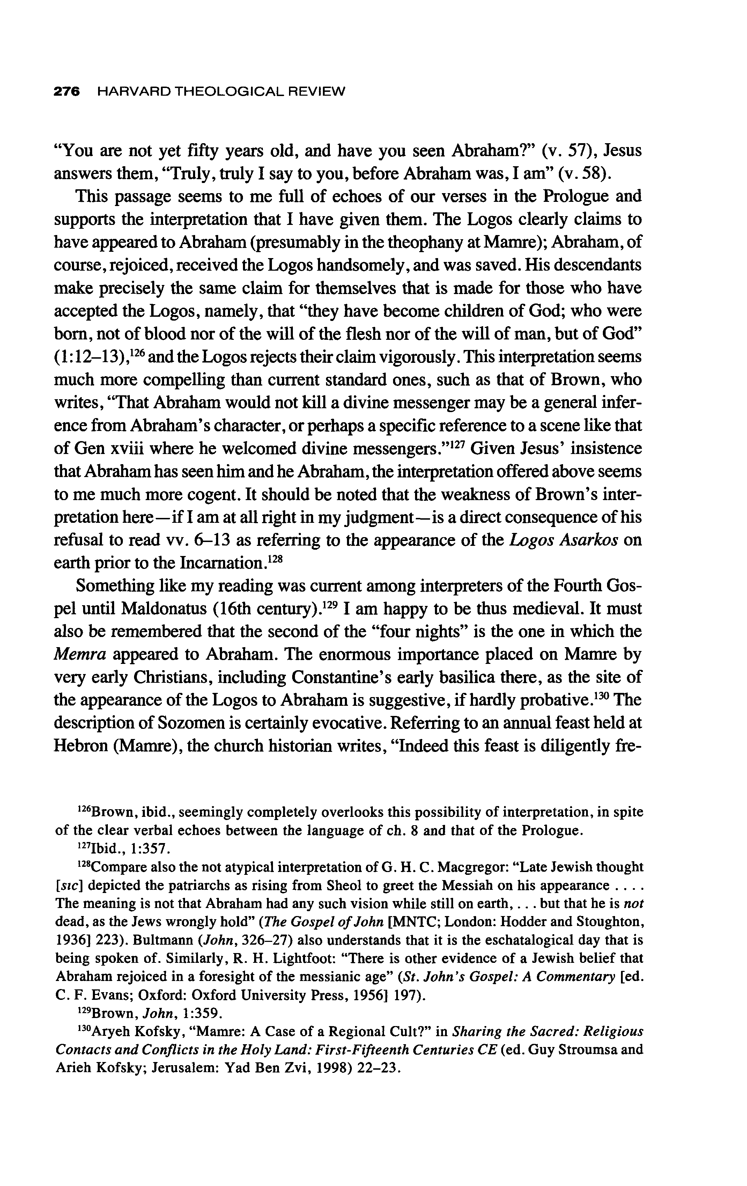
2 7 6 H A R V A R D T H E O L O G I C A L REVIEW
"You are not yet fifty years old, and have you seen Abraham?" (v. 57), Jesus
answers them, "Truly, truly I say to you, before Abraham was, I am" (v. 58).
This passage seems to me full of echoes of our verses in the Prologue and
supports the interpretation that I have given them. The Logos clearly claims to
have appeared to Abraham (presumably in the theophany at Mamre); Abraham, of
course, rejoiced, received the Logos handsomely, and was saved. His descendants
make precisely the same claim for themselves that is made for those who have
accepted the Logos, namely, that "they have become children of God; who were
born, not of blood nor of the will of the flesh nor of the will of man, but of God"
(1:12-13),126 and the Logos rejects their claim vigorously. This interpretation seems
much more compelling than current standard ones, such as that of Brown, who
writes, "That Abraham would not kill a divine messenger may be a general infer-
ence from Abraham's character, or perhaps a specific reference to a scene like that
of Gen xviii where he welcomed divine messengers."127 Given Jesus' insistence
that Abraham has seen him and he Abraham, the interpretation offered above seems
to me much more cogent. It should be noted that the weakness of Brown's inter-
pretation here—if I am at all right in my judgment—is a direct consequence of his
refusal to read vv. 6-13 as referring to the appearance of the Logos Asarkos on
earth prior to the Incarnation.128
Something like my reading was current among interpreters of the Fourth Gos-
pel until Maldonatus (16th century).1291 am happy to be thus medieval. It must
also be remembered that the second of the "four nights" is the one in which the
Memra appeared to Abraham. The enormous importance placed on Mamre by
very early Christians, including Constantine's early basilica there, as the site of
the appearance of the Logos to Abraham is suggestive, if hardly probative.130 The
description of Sozomen is certainly evocative. Referring to an annual feast held at
Hebron (Mamre), the church historian writes, "Indeed this feast is diligently fre-
126Brown, ibid., seemingly completely overlooks this possibility of interpretation, in spite
of the clear verbal echoes between the language of ch. 8 and that of the Prologue.
127Ibid., 1:357.
128Compare also the not atypical interpretation of G. H. C. Macgregor: "Late Jewish thought
[sic] depicted the patriarchs as rising from Sheol to greet the Messiah on his appearance . . . .
The meaning is not that Abraham had any such vision while still on earth,. . . but that he is not
dead, as the Jews wrongly hold" (The Gospel of John [MNTC; London: Hodder and Stoughton,
1936] 223). Bultmann (John, 326-27) also understands that it is the eschatalogical day that is
being spoken of. Similarly, R. H. Lightfoot: "There is other evidence of a Jewish belief that
Abraham rejoiced in a foresight of the messianic age" (St. John's Gospel: A Commentary [ed.
C. F. Evans; Oxford: Oxford University Press, 1956] 197).
129Brown, John, 1:359.
130Aryen Kofsky, "Mamre: A Case of a Regional Cult?" in Sharing the Sacred: Religious
Contacts and Conflicts in the Holy Land: First-Fifteenth Centuries CE (ed. Guy Stroumsa and
Arieh Kofsky; Jerusalem: Yad Ben Zvi, 1998) 22-23.
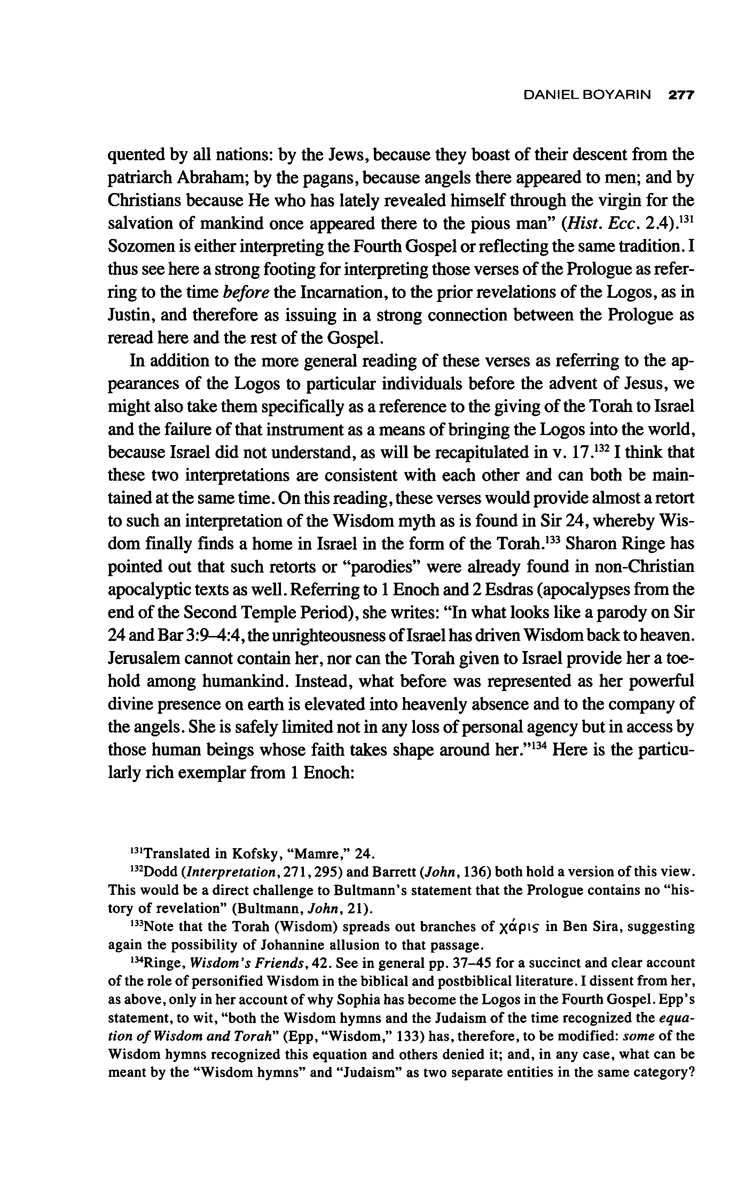
DANIEL B O Y A R Í N 2 7 7
quented by all nations: by the Jews, because they boast of their descent from the
patriarch Abraham; by the pagans, because angels there appeared to men; and by
Christians because He who has lately revealed himself through the virgin for the
salvation of mankind once appeared there to the pious man" (Hist. Ecc. 2.4).131
Sozomen is either interpreting the Fourth Gospel or reflecting the same tradition. I
thus see here a strong footing for interpreting those verses of the Prologue as refer-
ring to the time before the Incarnation, to the prior revelations of the Logos, as in
Justin, and therefore as issuing in a strong connection between the Prologue as
reread here and the rest of the Gospel.
In addition to the more general reading of these verses as referring to the ap-
pearances of the Logos to particular individuals before the advent of Jesus, we
might also take them specifically as a reference to the giving of the Torah to Israel
and the failure of that instrument as a means of bringing the Logos into the world,
because Israel did not understand, as will be recapitulated in v. 17.1321 think that
these two interpretations are consistent with each other and can both be main-
tained at the same time. On this reading, these verses would provide almost a retort
to such an interpretation of the Wisdom myth as is found in Sir 24, whereby Wis-
dom finally finds a home in Israel in the form of the Torah.133 Sharon Ringe has
pointed out that such retorts or "parodies" were already found in non-Christian
apocalyptic texts as well. Referring to 1 Enoch and 2 Esdras (apocalypses from the
end of the Second Temple Period), she writes: "In what looks like a parody on Sir
24 and Bar 3:9-4:4, the unrighteousness of Israel has driven Wisdom back to heaven.
Jerusalem cannot contain her, nor can the Torah given to Israel provide her a toe-
hold among humankind. Instead, what before was represented as her powerful
divine presence on earth is elevated into heavenly absence and to the company of
the angels. She is safely limited not in any loss of personal agency but in access by
those human beings whose faith takes shape around her."134 Here is the particu-
larly rich exemplar from 1 Enoch:
131Translated in Kofsky, "Mamre," 24.
132Dodd (Interpretation, 271,295) and Barrett (John, 136) both hold a version of this view.
This would be a direct challenge to Bultmann's statement that the Prologue contains no "his-
tory of revelation" (Bultmann, John, 21).
133Note that the Torah (Wisdom) spreads out branches of χ α ρ is in Ben Sira, suggesting
again the possibility of Johannine allusion to that passage.
134Ringe, Wisdom's Friends, 42. See in general pp. 37-45 for a succinct and clear account
of the role of personified Wisdom in the biblical and postbiblical literature. I dissent from her,
as above, only in her account of why Sophia has become the Logos in the Fourth Gospel. Epp's
statement, to wit, "both the Wisdom hymns and the Judaism of the time recognized the equation of Wisdom and Torah" (Epp, "Wisdom," 133) has, therefore, to be modified: some of the Wisdom hymns recognized this equation and others denied it; and, in any case, what can be
meant by the "Wisdom hymns" and "Judaism" as two separate entities in the same category?
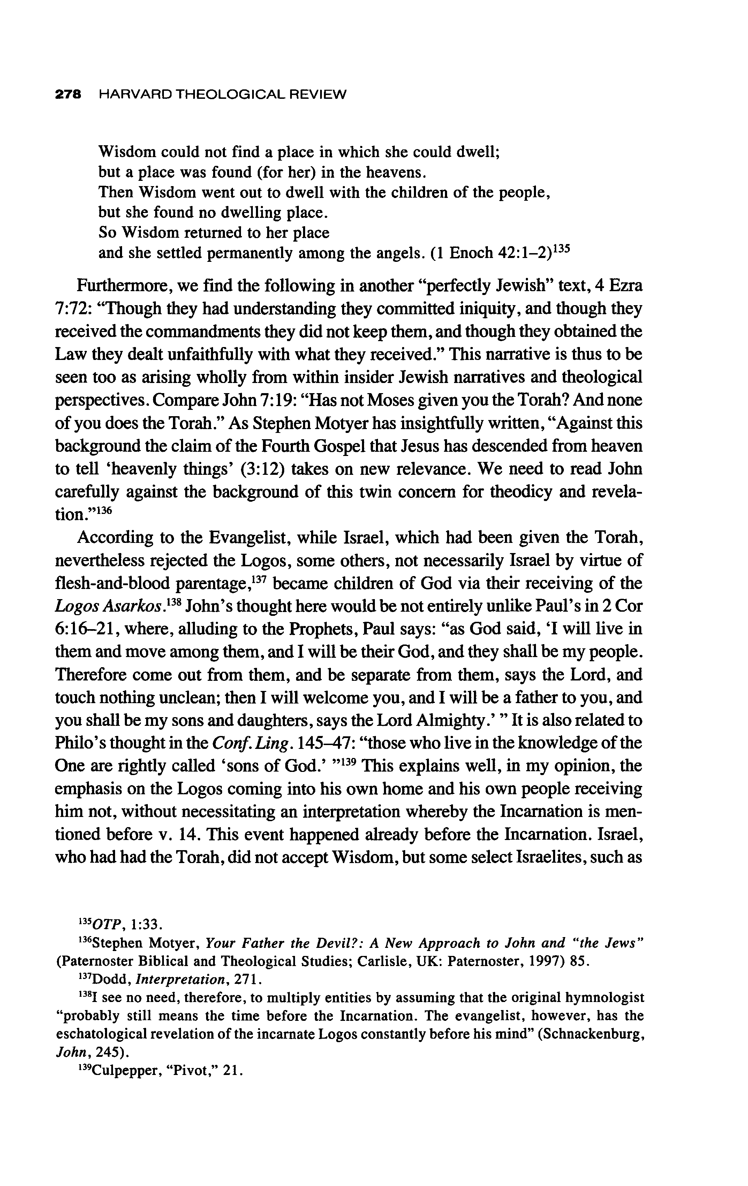
2 7 8 HARVARD T H E O L O G I C A L REVIEW
Wisdom could not find a place in which she could dwell;
but a place was found (for her) in the heavens.
Then Wisdom went out to dwell with the children of the people,
but she found no dwelling place.
So Wisdom returned to her place
and she settled permanently among the angels. (1 Enoch 42:l-2)135
Furthermore, we find the following in another "perfectly Jewish" text, 4 Ezra
7:72: "Though they had understanding they committed iniquity, and though they
received the commandments they did not keep them, and though they obtained the
Law they dealt unfaithfully with what they received." This narrative is thus to be
seen too as arising wholly from within insider Jewish narratives and theological
perspectives. Compare John 7:19: "Has not Moses given you the Torah? And none
of you does the Torah." As Stephen Motyer has insightfully written, "Against this
background the claim of the Fourth Gospel that Jesus has descended from heaven
to tell 'heavenly things' (3:12) takes on new relevance. We need to read John
carefully against the background of this twin concern for theodicy and revelation."136
According to the Evangelist, while Israel, which had been given the Torah,
nevertheless rejected the Logos, some others, not necessarily Israel by virtue of
flesh-and-blood parentage,137 became children of God via their receiving of the
Logos Asarkos.13* John's thought here would be not entirely unlike Paul's in 2 Cor
6:16-21, where, alluding to the Prophets, Paul says: "as God said, Ί will live in
them and move among them, and I will be their God, and they shall be my people.
Therefore come out from them, and be separate from them, says the Lord, and
touch nothing unclean; then I will welcome you, and I will be a father to you, and
you shall be my sons and daughters, says the Lord Almighty.' " It is also related to
Philo's thought in the Conf. Ling. 145-47: "those who live in the knowledge of the
One are rightly called 'sons of God.' "139 This explains well, in my opinion, the
emphasis on the Logos coming into his own home and his own people receiving
him not, without necessitating an interpretation whereby the Incarnation is mentioned before v. 14. This event happened already before the Incarnation. Israel, who had had the Torah, did not accept Wisdom, but some select Israelites, such as
n5OTP, 1:33.
136Stephen Motyer, Your F









